The Gospel According to Thomas Jefferson, Charles Dickens, and Count Leo Tolstoy: Discord
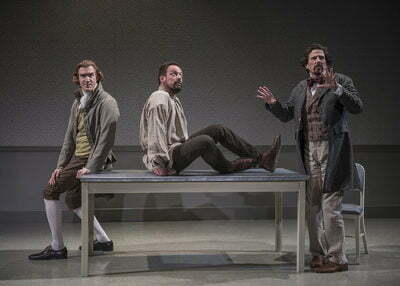 By Scott Carter
By Scott Carter
Directed by Kimberly Senior
Produced by Northlight Theatre, Skokie
Judging the Dead an Unproductive Exercise
What happens when you throw together a dead president, the best-selling English-language author of the nineteenth century, and an aristocratic Christian anarchist? As it turns out, not much. Director Kimberly Senior and her three-man cast wring every bit of drama and humor they can out of Scott Carter’s dry idea-play, but the gospel according to these three people who have all faded into and been surpassed by history is long on premise and doesn’t delve much deeper into philosophy than most people are likely to have already gone on their own. Actually, upon examination, the premise is self-defeating, but more on that later. It does contain some fine performances though, and another round at the sort of questions Carter asks is what a lot of people consider leisure to be for.
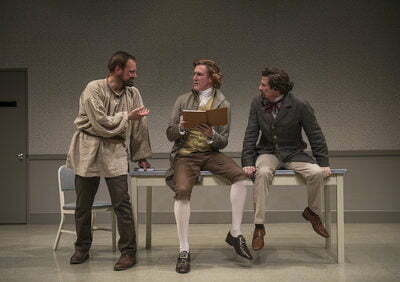
The play begins with Thomas Jefferson (Nathan Hosner) being thrust into an interrogation room, and the door locking behind him. The room (designed by Jack Magaw) being entirely made out of modern materials, he is quite confused, and becomes even more so when Charles Dickens (Jeff Parker) stumbles in after him. To Jefferson, it seems no time has passed since his death in 1826, but Dickens died in 1870, and his is followed by Lev/Leo Tolstoy (Mark Montgomery), who was born in 1828 and died in 1910. The men are given no instructions about what, if anything they are supposed to be doing, and are unaware that the fourth wall is a one-way mirror. However, they gradually piece together that each of them edited their own version of the gospel, and conclude, based on some vague hints from the room’s unseen operator, that they are to pool their knowledge to write another sacred text.
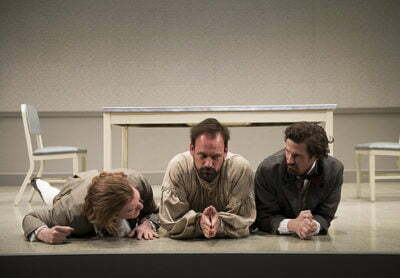 They are unable to even agree on the first sentence. Jefferson, whose gospel was made up entirely of direct quotes from Jesus, regards him as a teacher of rational morality to be admired, not worshipped. Dickens, who wrote his gospel for his children, wanted to portray the life of Christ as a melodramatic fantasy adventure, and he clings to the idea of his hero having been magical. Tolstoy interpreted Jesus’s words as a guide to anarcho-pacifism, which he believes is the key to spiritual fulfillment. They argue, things get personal, and deep-seated character flaws are exposed. Jefferson and Tolstoy are united by their superior educations and knowledge of Christianity’s early history, but Dickens and Tolstoy have more knowledge of historical progression in a post-Enlightenment world. None of the three men has lived up to the ideals they espoused.
They are unable to even agree on the first sentence. Jefferson, whose gospel was made up entirely of direct quotes from Jesus, regards him as a teacher of rational morality to be admired, not worshipped. Dickens, who wrote his gospel for his children, wanted to portray the life of Christ as a melodramatic fantasy adventure, and he clings to the idea of his hero having been magical. Tolstoy interpreted Jesus’s words as a guide to anarcho-pacifism, which he believes is the key to spiritual fulfillment. They argue, things get personal, and deep-seated character flaws are exposed. Jefferson and Tolstoy are united by their superior educations and knowledge of Christianity’s early history, but Dickens and Tolstoy have more knowledge of historical progression in a post-Enlightenment world. None of the three men has lived up to the ideals they espoused.
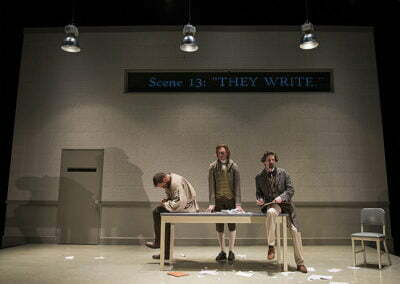 The problem is that everybody, including them, already knew that. Jefferson doesn’t need to have heard of Jean-Paul Sartre to realize that the mere existence of this room explodes his rationalism, and the confusing, vaguely hostile signals of whoever operates it seem to contradict Tolstoy’s belief that power is unholy, as well. Furthermore, Jefferson knew that slavery was wrong, and admitted as much in many of his writings. It’s implausible that such a long time would elapse before he realizes what he’s being detained for, and the same goes for Tolstoy’s hypocrisy and Dickens’s cruel treatment of his family. It is also strange that Dickens and Tolstoy allow Jefferson to get away with saying “my servants” for more than an hour while they believe the divine eye is scrutinizing them. However, Carter prevents the men from ganging up on each other too much by making Jefferson very perceptive. Though he has no prior knowledge of the other two, he figures them out once he starts paying more attention to personality than ideas, and is better able to hold his own.
The problem is that everybody, including them, already knew that. Jefferson doesn’t need to have heard of Jean-Paul Sartre to realize that the mere existence of this room explodes his rationalism, and the confusing, vaguely hostile signals of whoever operates it seem to contradict Tolstoy’s belief that power is unholy, as well. Furthermore, Jefferson knew that slavery was wrong, and admitted as much in many of his writings. It’s implausible that such a long time would elapse before he realizes what he’s being detained for, and the same goes for Tolstoy’s hypocrisy and Dickens’s cruel treatment of his family. It is also strange that Dickens and Tolstoy allow Jefferson to get away with saying “my servants” for more than an hour while they believe the divine eye is scrutinizing them. However, Carter prevents the men from ganging up on each other too much by making Jefferson very perceptive. Though he has no prior knowledge of the other two, he figures them out once he starts paying more attention to personality than ideas, and is better able to hold his own.
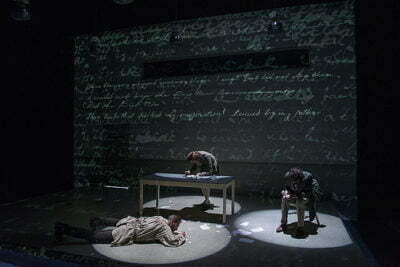 The most interesting aspect of the play is Dickens’s presence. Hosner gives a remarkably realistic performance as Jefferson, the quietest of the founders, and Montgomery gives a comically boisterous and not remotely pacifistic performance as Tolstoy (who really did speak English), but Jeff Parker’s Dickens is an excited mess of nerves and contradictions. On the surface, the comparison of Dickens, who never sought or wielded any real power, to people who owned hundreds of other people and encouraged whole nations to suffer and die for their ideals is ridiculous. But while Jefferson and Tolstoy’s cowardly cynicism was impersonal and indirect, Dickens’s attempts to destroy his wife and grown children’s reputations to rehabilitate his own were personal and malicious. They’re also not nearly as well-known, which makes his reckoning with them a much stronger dramatic moment. Even in the throes of remorse, Parker’s Dickens can’t help but express a bit of glee at his own inventive audacity, just as he’s been doing to a lesser degree throughout the play. It that sense, Carter provoked a response from this disinterested viewer after, albeit on an incidental subject. I fully grant that people who enjoy discussing the gospels will probably find much more to enjoy in this show, but for such people, this is probably even more well-trodden ground.
The most interesting aspect of the play is Dickens’s presence. Hosner gives a remarkably realistic performance as Jefferson, the quietest of the founders, and Montgomery gives a comically boisterous and not remotely pacifistic performance as Tolstoy (who really did speak English), but Jeff Parker’s Dickens is an excited mess of nerves and contradictions. On the surface, the comparison of Dickens, who never sought or wielded any real power, to people who owned hundreds of other people and encouraged whole nations to suffer and die for their ideals is ridiculous. But while Jefferson and Tolstoy’s cowardly cynicism was impersonal and indirect, Dickens’s attempts to destroy his wife and grown children’s reputations to rehabilitate his own were personal and malicious. They’re also not nearly as well-known, which makes his reckoning with them a much stronger dramatic moment. Even in the throes of remorse, Parker’s Dickens can’t help but express a bit of glee at his own inventive audacity, just as he’s been doing to a lesser degree throughout the play. It that sense, Carter provoked a response from this disinterested viewer after, albeit on an incidental subject. I fully grant that people who enjoy discussing the gospels will probably find much more to enjoy in this show, but for such people, this is probably even more well-trodden ground.
Somewhat Recommended
Jacob Davis
Reviewed May 13, 2016
For more information, see The Gospel According to Thomas Jefferson, Charles Dickens, and Count Leo Tolstoy: Discord’s page on Theatre in Chicago.
Playing at Northlight Theatre, 9501 Skokie Blvd, Skokie. Tickets are $25-79, with student tickets for $15 subject to availability; to order, call 847-673-6300 or visit northlight.org. Performances are Wednesdays at 7:30 (plus 1:00 pm on May 25), Thursdays at 7:30 pm, Fridays at 8:00 pm, Saturdays at 2:30 pm and 8:00 pm, Sunday at 2:30 pm (and 7:00 pm on May 29) through June 12. Running time is ninety minutes with no intermission.

